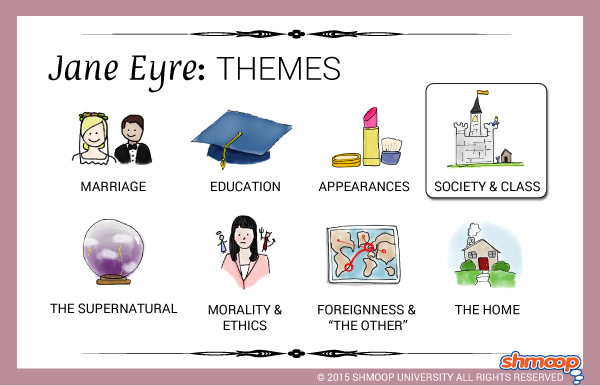 (Click the themes infographic to download.)
(Click the themes infographic to download.)
Jane Eyre (the novel, not the character) looks down its nose in disgust at the existing Victorian class hierarchy. The characters who are most interested in the trappings of wealth and status are hypocritical or morally misguided, but characters who take poverty on themselves to demonstrate their great moral natures are also mocked.
Instead of the normal class structures, Jane Eyre implies that poverty can be thoroughly respectable, as long as it’s accompanied by an earnest desire to better oneself—or at least to earn one’s keep. Of course, it’s easy to value poverty and hard work when, in the end, all the right people get the money.
Questions About Society and Class
- Where does Jane seem to stand in the social hierarchy? Does she have social mobility, or does her class status remain relatively constant?
- As a novel, how does Jane Eyre depict high society and wealthy aristocrats? What are their virtues? What are their flaws?
- How do Jane’s attitudes toward poverty and the poor change over the course of the novel? How does religion factor into this attitude change?
- Why does Jane have to become destitute before she can become wealthy?
- Why is it important for Jane to inherit wealth of her own before she marries Rochester?
Chew on This
In Jane Eyre, it is easier for characters to be morally pure if they are poor or if they refuse or renounce possible wealth.
Jane’s inheritance brings with it financial freedom and personal independence; without these, she would not be able to bring herself to marry Rochester, because in doing so she would become his dependent.